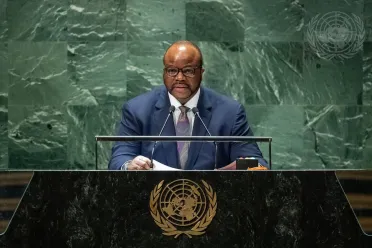Statement
Statement summary
MSWATI III, Head of State of Eswatini, said that it is increasingly evident that sustainable development “is not just a noble aspiration” in a world faced with complex challenges; rather, it “is an imperative for the survival and well-being of our planet and its inhabitants”. Just as the founders of the United Nations once came together to “address the challenges of their time for the benefit of all, it is now our responsibility to stand together and confront those we face today”, he urged. Expressing concern over global conflicts and unconstitutional changes of Government in several African States, he also spotlighted natural disasters that have claimed thousands of lives in Libya, Morocco and elsewhere. Additionally, he encouraged efforts underway to find a political solution to the matter regarding the Western Sahara within the parameters of Security Council resolution 2654 (2022).
He went on to report that Eswatini’s implementation of the Sustainable Development Goals has been impacted — like that of all other Member States — by multiple shocks at both the global and national levels. However, the country is committed to achieving these targets, and he noted that Eswatini has been ranked in the top five countries in terms of economic growth by the World Bank, with an increase in GDP of about 7.8 per cent. It also placed sixth on the 2022 Africa Industrialization Index. However, recent global challenges have negatively impacted Eswatini’s ability to provide social services — including health and education — but, despite this, it has achieved significant reductions in the maternal mortality ratio and HIV prevalence among adults aged 15 to 49. Other progress includes increased opportunities for learning; increased access to electricity, water and sanitation services; an improved literacy rate among adults aged 15 and above; and increased enrolment in primary education.
He also said that Eswatini’s unique model of democracy accounts for its rich cultural heritage and traditional African values, in that it is grounded in respect, consensus and community support through traditional structures. It is a system based on individual merit — where candidates are nominated from their communities to stand for elections in constituencies to which they are accountable — he said, adding that the electorate “expects members of parliament to meet as colleagues rather than combatants”. Emphasizing that his country was hit hard by COVID‑19, he said that, despite progress in reducing poverty and inequality, “they remain high”. While Eswatini continues to battle with high unemployment — especially among youth — it has, with the support of the United Nations, launched a youth-empowerment programme. And while the country is highly dependent on external sources of income, the Government continues to implement structural reforms to improve the business environment, diversify the economy and foster inclusive growth.
Further, he stressed the need to re-evaluate the global financial architecture. Interest rates must be addressed in a way that is fair and beneficial for developing nations, and Member States must develop innovative financing strategies to ensure that implementation reaches those most left behind. Adding a call for Taiwan to be included in the United Nations system, he observed that this would not only strengthen global cooperation and partnership, but would also “emphasize the principle of ensuring that no one is left behind”.
Full statement
Read the full statement, in PDF format.
Photo

Previous sessions
Access the statements from previous sessions.
